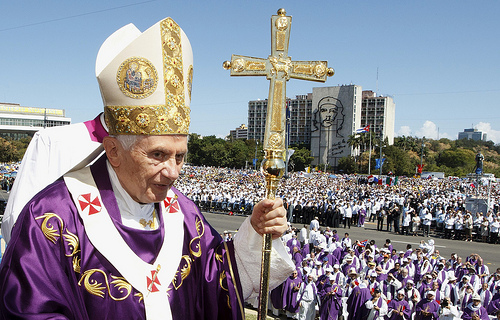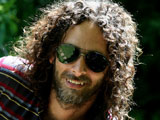30 Questions on the Repression of Religion
by Orlando Luis Pardo Lazo and translated by Alex Higson / October 14, 2013 / 2 Comments

Pope Benedict XVI carries his pastoral staff as he leaves after celebrating Mass in Revolution Square in Havana. Photo via flickr user MATEUS_27:24&25. Creative Commons
In September, two religious leaders living in Cuba, Reverend Mario Félix Lleonart and his wife, the missionary Yoaxis Marcheco, both of the Baptist Convention of Western Cuba, travelled to Washington, D.C. as guests of a Christian Solidarity Worldwide event. With them was Apostle Omar Gude of the Apostolic Movement, who was previously a political prisoner in Cuba and today lives in exile in the US.

- Is it worth-while to focus on the last images and letters coming from the inside of the last living utopia on Earth? Is Cuba by now a contemporary country or just another old-fashioned delusion in the middle of Nowhere-America? A Cold-War Northtalgia maybe? Can we expect a young Rewwwolution.cu within that Ancien Régime still known as The Revolution? I would like to provoke more questions than answers.

- Orlando Luis Pardo Lazo was born in Havana City and still resides and resists there, working as a free-lance writer, photographer and blogger. He is the author of Boring Home (2009) and is the editor of the independent opinion and literary e-zine Voces.
At the end of their visit, they released a joint statement on religious freedom on the island, titled “Thirty Questions for the Cuban Government,” which has already gone down in history. It’s a manifesto that in some ways recalls Martin Luther’s redemptive discourse in the absolutist Europe of the sixteenth century.
The revolutionary Cuban state, which according to the Constitution is communist and atheist, officially became “secular” in the early 1990s. However, Religious education has been banned for half a century and there is not a single space available to utter God’s name in the Cuban media. The Cuban Communist Party Central Committee’s all-powerful Office of Religious Affairs monitors, controls, and manipulates any situation of this kind.
The thirty questions range from demands for the return of property confiscated from Cuban churches, to remembrance for the atheist apartheid against believers (the latter were sent to re-education camps in the 1960s). The statement also asks for a denunciation of the repression that has taken place during the few authorized religious processions and during Pope Benedict XVI’s visit in March 2012 (at which there were hundreds of preemptive arrests without charge), as well as revelation of high-level infiltration of cult organizations (such as the Great Masonic Lodge) by State Security agents. There is also a call for the release of US contractor Alan Gross (imprisoned in Cuba for improving internet access for the Jewish community) as well as an independent investigation into the unexpected deaths of dissident Christian leaders such as Laura Pollán of the Damas de Blanco (Ladies in White) and Oswaldo Payá of the Movimiento Cristiano Liberación (Christian Liberation Movement).
If the Cuban government today wants to feign even a small amount of legitimacy, it should take responsibility for responding to these thirty questions, which our citizens should have posed decades ago.





2 Comments on "30 Questions on the Repression of Religion"
OLPL, congratulations and thank you for continuing to voice the thruth about the 54 year old cuban dictatorship, and always lending support to those who do the same.
Religious freedom is a human right in any society that respects its citizens. On principle, I support the thirty questions and its creators.
Trackbacks for this post